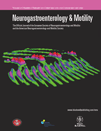
NEUROGASTROENTEROLOGY AND MOTILITY
Scope & Guideline
Pioneering Research in Gastrointestinal Function and Control
Introduction
Aims and Scopes
- Disorders of Gut-Brain Interaction:
The journal explores how psychological factors, including stress and anxiety, affect gastrointestinal motility and function. This includes studies on the psychosocial dimensions of disorders like irritable bowel syndrome (IBS) and functional dyspepsia. - Gastrointestinal Motility Disorders:
Research focuses on the physiological and pathological mechanisms underlying various motility disorders, such as achalasia, gastroparesis, and constipation, using advanced diagnostic tools like high-resolution manometry and functional lumen imaging. - Innovative Therapeutic Approaches:
The journal publishes studies on novel treatments for gastrointestinal disorders, including pharmacological therapies, dietary interventions, and neuromodulation techniques, highlighting their efficacy and safety. - Microbiota-Gut-Brain Axis:
Investigations into the role of gut microbiota in influencing gastrointestinal and neurological health are a key area of interest, with research exploring how alterations in microbiota can impact motility and overall gut health. - Clinical Practice Guidelines and Consensus Statements:
The journal serves as a platform for the dissemination of clinical guidelines and consensus statements from leading societies on the diagnosis and management of various gastrointestinal disorders.
Trending and Emerging
- Telemedicine and Digital Health:
The COVID-19 pandemic has accelerated the adoption of telemedicine in gastroenterology, with increasing publications focusing on remote consultations, digital health interventions, and their impacts on patient care outcomes. - Psychogastroenterology:
There is a growing emphasis on the psychological aspects of gastrointestinal disorders, particularly how psychological interventions and cognitive-behavioral therapy can improve symptoms and quality of life for patients. - Personalized Medicine:
Research into personalized treatment strategies based on genetic, microbiotic, and individual patient characteristics is emerging as a key focus area, aiming to tailor therapies for better efficacy in managing gastrointestinal disorders. - Microbiome Research:
Studies investigating the gut microbiome and its relationship with gastrointestinal health are on the rise, highlighting the importance of microbiota in modulating motility and gut-brain interactions. - Neurostimulation Techniques:
Innovations in neurostimulation for gastrointestinal disorders, including transcutaneous and peripheral nerve stimulation, are gaining traction, with more studies exploring their mechanisms and clinical applications.
Declining or Waning
- Traditional Pharmacotherapy:
There is a noticeable decline in studies focusing solely on traditional pharmacological treatments for gastrointestinal disorders, as more attention is now directed toward integrative and multimodal approaches that include behavioral therapies and lifestyle modifications. - Basic Science Studies:
Research purely focused on basic science without direct clinical implications seems to be waning, with a shift towards studies that bridge basic science with clinical applications, particularly in understanding disease mechanisms. - Epidemiological Studies:
While still important, the frequency of broad epidemiological studies on gastrointestinal disorders appears to be decreasing, as researchers may be more focused on specific populations or mechanistic studies. - Invasive Diagnostic Procedures:
There is a trend towards less emphasis on invasive procedures for diagnosis, with a growing interest in non-invasive methods such as imaging and biomarkers, which may lead to a reduction in traditional diagnostic studies.
Similar Journals

GUT
Pioneering Research for Digestive Health ExcellenceGUT is a premier journal in the field of gastroenterology, published by the esteemed BMJ Publishing Group. With a rich history dating back to 1960 and an impressive convergence of research expected to continue through 2024, GUT has established itself as a cornerstone of academic discourse in the gastrointestinal sciences. The journal boasts a remarkable impact factor, positioning it in the Q1 category for gastroenterology with an outstanding rank of #3 out of 167 in its Scopus ranking, reflecting its 98th percentile status among peers. Although it does not currently offer open access options, GUT remains dedicated to disseminating high-quality research, reviews, and clinical studies that advance the understanding of digestive health. Published in the United Kingdom, GUT serves as an essential resource for researchers, clinicians, and students aiming to stay at the forefront of innovations and developments in the field.

Translational Gastroenterology and Hepatology
Advancing Patient Outcomes through Translational Research.Translational Gastroenterology and Hepatology, published by AME Publishing Company, stands as a pivotal platform for advancing the understanding and treatment of gastrointestinal and liver diseases. With its focus on translational research, this journal aims to bridge the gap between laboratory discoveries and clinical applications, thus fostering improvements in patient care. Although specific metrics like H-Index and Scopus ranks are currently unavailable, the journal is committed to maintaining high standards of scholarly communication and excellence. As an open-access publication, it ensures that valuable findings are readily accessible to a global audience, promoting collaboration and innovation among researchers, clinicians, and healthcare professionals invested in gastroenterology and hepatology. The journal's dedication to disseminating groundbreaking research makes it an essential resource for those seeking to stay at the forefront of these ever-evolving fields.
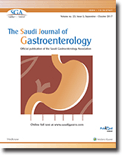
Saudi Journal of Gastroenterology
Championing open access to vital gastroenterological findings.The Saudi Journal of Gastroenterology is a premier platform dedicated to advancing research and clinical practice in the field of gastroenterology. Published by Wolters Kluwer Medknow Publications, this open-access journal has been serving the academic community since 1995 from its base in India. With an ISSN of 1319-3767 and an E-ISSN of 1998-4049, the journal allows unrestricted access to a wealth of knowledge, fostering an environment where researchers, professionals, and students can engage with cutting-edge studies. As of 2023, it is categorized in the Q3 quartile within gastroenterology, ranking #74 out of 167 in Scopus, which places it within the 55th percentile of its field. The journal aims to disseminate significant findings, clinical trials, and innovative theories that shape the understanding of gastrointestinal disorders and practices. With a commitment to quality and relevance, the Saudi Journal of Gastroenterology is pivotal for anyone seeking to enhance their knowledge and expertise in this vital area of medicine.

DIGESTIVE DISEASES
Exploring the Frontiers of Digestive Medicine.DIGESTIVE DISEASES, published by KARGER, stands as a leading international journal dedicated to the field of gastroenterology and digestive health. With an ISSN of 0257-2753 and E-ISSN 1421-9875, the journal has been providing a platform for high-quality research since its inception in 1983, continuing to disseminate groundbreaking findings and insights through to 2024. Positioned in the second quartile (Q2) of both the gastroenterology and miscellaneous medicine categories as of 2023, DIGESTIVE DISEASES is recognized for its rigorous peer-review process and its contributions to advancing clinical and experimental gastroenterological knowledge. Its Scopus ranking at #62 out of 167 in the gastroenterology field reflects its significant impact, as it reaches a notable 63rd percentile among its peers. While it does not currently offer open access options, its subscription model ensures that vital research is available to professionals and institutions committed to the field. The journal serves as an essential resource for researchers, clinicians, and students alike who seek to deepen their understanding of digestive disorders and their implications in medicine.
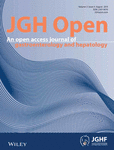
JGH Open
Fostering Collaboration for Global Health AdvancesJGH Open is a prominent open-access journal dedicated to advancing knowledge in the fields of Gastroenterology and Hepatology, published by WILEY. Since its inception in 2017, the journal has served as a crucial platform for researchers, professionals, and students to disseminate innovative research findings and clinical insights. With an impact factor and Scopus rankings reflecting its steady growth—ranking in the 3rd quartile for both Gastroenterology (Q3) and Hepatology (Q3)—JGH Open is positioned within the competitive landscape of medicine. Its commitment to open access enhances the visibility and accessibility of high-quality research, ensuring that significant advancements in understanding diseases of the gastrointestinal tract and liver reach a broad audience. With a focus on collaboration and dissemination of knowledge, JGH Open aims to contribute to the global discourse and improve outcomes in gastrointestinal health.

Pediatric Gastroenterology Hepatology & Nutrition
Bridging research and clinical excellence in pediatric gastroenterology.Pediatric Gastroenterology Hepatology & Nutrition is a pivotal academic journal published by the Korean Society of Pediatric Gastroenterology & Nutrition, focusing on the critical fields of pediatric gastroenterology, hepatology, and nutrition. Located in South Korea, this journal aims to disseminate high-quality research, review articles, and clinical studies to advance knowledge and practice in the care of children with gastrointestinal and nutritional disorders. With a Converged Years span from 2012 to 2024 and categorized in the Q2 and Q3 quartiles in 2023 across multiple related fields, the journal holds a significant position within the academic community, reflecting its impactful contribution to the discipline. Although currently not open access, the journal ensures that content is accessible to a broad audience through various institutional subscriptions. The journal appeals to researchers, healthcare professionals, and students alike, providing an essential platform for the exchange of innovative ideas and research findings aimed at improving pediatric patient care.
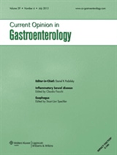
CURRENT OPINION IN GASTROENTEROLOGY
Fostering Dialogue on Gastrointestinal AdvancesCURRENT OPINION IN GASTROENTEROLOGY is a prestigious peer-reviewed journal published by Lippincott Williams & Wilkins, focusing on the latest advancements and emerging trends within the field of gastroenterology. Established in 1990, the journal has consistently provided a platform for researchers and practitioners to share insights and foster discussions on critical and evolving topics, making it a valuable resource for healthcare professionals and students alike. With its current ranking in the Q2 category of gastroenterology journals and a respectable 67th percentile in Scopus rankings, CURRENT OPINION IN GASTROENTEROLOGY strives to contribute significantly to clinical practices and research methodologies. Although it does not offer open access options, the journal is known for its rigorously curated articles that shape the future of gastroenterology, providing readers with comprehensive reviews and expert opinions. By covering a diverse range of topics, this journal aims to bridge the gap between research and practical application, reinforcing its role as a leader in advancing knowledge within the gastrointestinal field.

Gastroenterology Insights
Elevating Knowledge in Gastroenterology and HepatologyGastroenterology Insights is a premier open-access journal published by MDPI since 2009, focusing on essential research and developments within the fields of gastroenterology and hepatology. With a dedicated ISSN of 2036-7414 and E-ISSN 2036-7422, this journal serves as a vital platform for disseminating innovative studies and insights pertinent to gastrointestinal health, disorders, and treatment modalities. Based in Switzerland, Gastroenterology Insights boasts a significant academic presence, currently positioned in the Q3 quartile for both gastroenterology and hepatology categories as of 2023, reflecting its impactful contributions to the disciplines. With Scopus rankings placing it at the 94th and 48th positions in gastroenterology and hepatology respectively, the journal is committed to advancing knowledge and fostering collaboration among researchers, professionals, and students alike. By providing an open-access model, it ensures that high-quality research is accessible globally, thereby enhancing the reach and impact of crucial findings in the science of digestive health. Researchers looking to publish cutting-edge work will find Gastroenterology Insights a valuable resource for both sharing and acquiring knowledge.
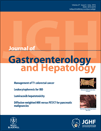
JOURNAL OF GASTROENTEROLOGY AND HEPATOLOGY
Elevating standards in gastrointestinal and liver disease research.Welcome to the JOURNAL OF GASTROENTEROLOGY AND HEPATOLOGY, an esteemed publication in the field of gastroenterology and hepatology, proudly published by WILEY. Established in 1986, this journal serves as a crucial platform for researchers, healthcare professionals, and students, presenting groundbreaking research and comprehensive reviews that drive advances in understanding and treating gastrointestinal and liver diseases. With a strong reputation evidenced by its Q1 ranking in gastroenterology and Q2 ranking in hepatology, this journal ranks impressively in the Scopus metrics - positioned at #22 out of 167 in gastroenterology and #21 out of 82 in hepatology, reflecting its contribution to scholarly excellence. Although it does not offer open access options, the journal’s rich archive and diverse topics make it indispensable for those dedicated to improving patient outcomes in these critical areas of medicine. Whether you are a seasoned researcher or an aspiring medical professional, engaging with this journal will keep you at the forefront of the latest developments and emerging trends in gastroenterology and hepatology research.
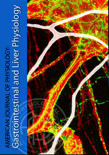
AMERICAN JOURNAL OF PHYSIOLOGY-GASTROINTESTINAL AND LIVER PHYSIOLOGY
Shaping the Future of Digestive and Liver Health ResearchAmerican Journal of Physiology-Gastrointestinal and Liver Physiology, published by the American Physiological Society, stands as a leading journal in the domains of gastroenterology, hepatology, and overall physiology. With an impressive impact factor and consistent ranking in the Q1 quartile across multiple categories, this journal provides a vital platform for disseminating advanced research and innovative findings related to gastrointestinal and liver physiology. Since its inception in 1980, the journal has fostered a community of researchers and clinicians dedicated to understanding and improving digestive and liver health. While maintaining a traditional subscription model, it ensures high-quality peer-reviewed content that is crucial for informed professional practice and academic inquiry. The journal’s Scopus ranks highlight its significant impact in the fields of gastroenterology and hepatology, making it an indispensable resource for academics and practitioners alike, eagerly exploring both foundational and cutting-edge topics in physiology.